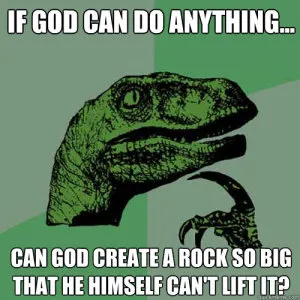During my time as a proselytizing missionary in Hong Kong, a college student approached me and asked me a question: “Could God Create A Stone So Heavy That He Could Not Lift It?” The snide look on his face implied that he had dug a trench around us and there was no way out. Not being philosophically trained, my first instinct was to tell him that God simply would not do something like that, and of course an argument ensued. As I think back on that moment, the answer I gave then would pretty much be the same answer today, but perhaps with better elaboration.
The omnipotence paradox is not a modern problem, but one that was faced by the early Christian theologians. These apparent paradoxes often trip up many Mormon missionaries and other people of the Christian faith, thus it is important to see how one can work around these seemingly semantic traps.
One of the implicit assumptions of the Christian God is that he is “absolutely powerful”. He can do what he wants whenever he wants. Advocates of this paradox claim that it promotes atheism and the idea of God is shattered. Some people cling to this belief, but my view would be that God is not “absolutely omnipotent”, but almighty and logically omnipotent.
You’re probably wondering what these terms mean. Almighty would be God’s claim on power to be greater than all other “creatures”. Neither humans, animals, nor any other living thing would have the same aggregate abilities as God. The God of the Mormon faith is believed to be bound by natural laws. For example, Mormons believe that the demands of Justice cannot be robbed by mercy unless a redeemer satisfies them. So, God (according to Mormon belief) cannot snap his fingers and do away with natural laws that supersede his own power. (The question here is where these natural laws came from and why don’t we worship those instead-which will be addressed later). That’s why when we claim that God is almighty, we are not making a claim to his absolute powers, but rather his abilities to do things that far exceed our own.
Logically omnipotent would be saying that God will only do things that are logically consistent. For example, God (Y) will only do variable X if X is consistent with the attributes of God (Y). Thus, God would not create a rock too heavy because then it would destroy his omnipresence. A common rebuttal of the paradox advocates claim would be that Humans create boats all the time that they cannot lift, does this destroy the claim to their creation power?
So perhaps if I was back in Hong Kong on that hot sunny day I would have spent more time explaining these nuances to that college kid, but now you may have something to talk about with your atheist friends.